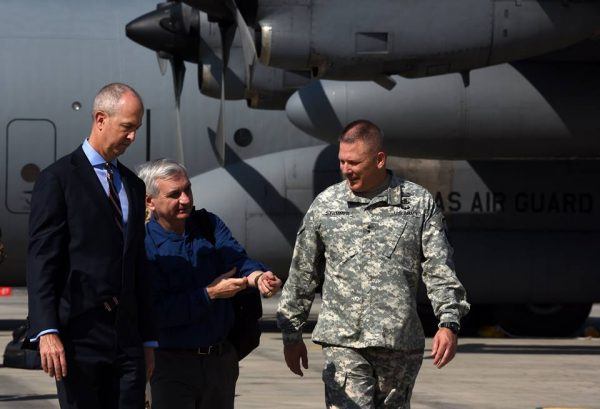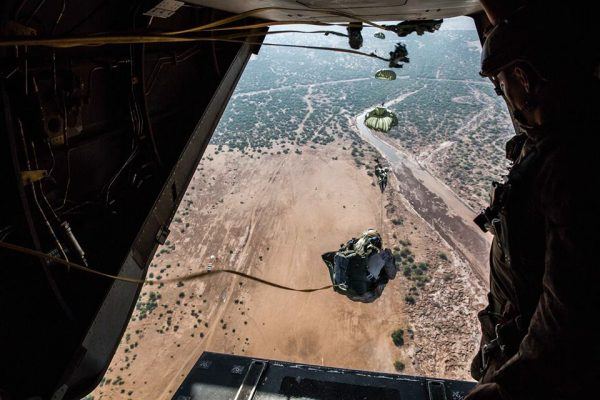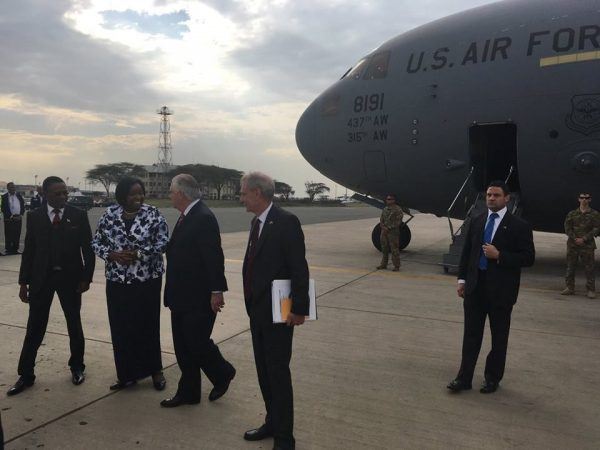Earlier this month, Democratic Senator Jack Reed of the Armed Services Committee returned from his trip to Africa.
The report the senator gave on the influence in the region of America’s adversaries upon his return was disconcerting, to say the least.
At a press conference held after his arrival back in Washington, Reed warned of China’s growing influence on the continent. “Wherever we’re going in Africa, they seem to be there, or following close behind,” the senator told media outlets.
On his trip, Reed received a close-up look at China’s growing assets in Africa and the country’s attempts to expand its military and political sway in different regions. China has lent a “huge amount of money” to Djibouti and is “moving into” northern Kenya with a “major investment,” Reed said.

China’s appearance in Africa has been a growing concern for both US policymakers and military brass in the recent period. Back in September, the head of US Africa Command, General Thomas Waldhauser told news sources that Chinese expansion into Djibouti presented “unique challenges” to American military operations in the continent. As Senator Reed put it in the same conference, “We have to first recognize [the Chinese] are a factor now, whereas years ago they were not a factor,” he said. “We have to keep a watchful eye on what they’re doing. We certainly want to be welcomed in countries and not ignored or dismissed because of influence by other powers, including China. We want to maintain opportunities both economic and political in Africa.”
China’s inroads into Africa have taken both military and economic forms. In 2016, China began the construction of its first ever foreign military installation in Djibouti. The base was formally opened on August 1, 2017, with the first live-fire exercises taking place the following month. The Chinese dubbed the base a “logistical support” facility, which made American military leaders particularly nervous. China’s stated purpose for the base is to provide logistic support for Chinese troops in the Gulf of Aden, offer peacekeeping and humanitarian operations in Africa, and bolster the Chinese navy’s efforts to prevent piracy emanating from the Horn of Africa.
But the fact that the base is located just a stone’s throw away from the United States’ Camp Lemonnier, a special-operations outpost, puts China in a position to possibly threaten American military operations in the region. One such operation is the US effort in Yemen, a country where America supports a military coalition led by its ally Saudi Arabia and also conducts its own strikes targeting jihadist groups. Just a few months before the base’s official opening, General Waldhauser stated in a Washington press conference that “there are some very significant operational security concerns” the US has about China’s presence in Djibouti.

In many ways, the Djibouti outpost was the culmination of years of military dabbling in Africa on the part of the People’s Republic of China (PRC), which has included the deployment of troops under the umbrella of UN missions and the commitment of 8,000 soldiers to the UN peacekeeping standby force in 2015. Currently, more than 2,500 Chinese combat-ready soldiers and police officers deployed in “blue-helmet” missions across the African continent. Additionally, in the past ten years, China has installed military attachés in at least 14 African countries.
On the economics end, China’s investments in Africa, while going back decades, have spiked sharply in recent years. Within the context of the China-Africa Cooperation (FOCAC) plan, Beijing has poured billions into massive infrastructure projects in Africa, such as a $3.8 billion, 298-mile stretch of railway connecting Kenya’s capital of Nairobi and its port city of Mombasa. Just three years ago during the 2015 FOCAC meeting in Johannesburg, Chinese President Xi Jinping pledged $60 billion in loans and assistance to various projects throughout Africa.
China’s penetration into Africa has grown to the point that some observers have begun to suspect Chinese interference in African political events, most recently in the ousting of Zimbabwe’s leader Robert Mugabe. To be fair, the suggestion that China is exerting such influence is absurd. China possesses neither the wherewithal nor the political weight to trigger coups or otherwise bring about regime change. However, the very fact that anyone is even talking about the “China factor” in regards to the African political landscape underscores a very important fact. China is now a very important force in Africa.
This power is not due to China intervening in the internal affairs of countries, but in having rival political opponents in African nations compete for its support and investment. In this way, China can influence leaders to accommodate its interests and open their doors to Chinese installations, both military and industrial.
The reality of China’s presence in Africa has begun to bring about reactions from the US administration. According to American media outlets, the US State Department has expressed “frustration” over China’s expanding influence among several nations in Africa. News of the State Department’s concerns came just before Secretary of State Rex Tillerson embarked on his current Africa tour to visit heads of state in Chad, Djibouti, Ethiopia, Kenya, and Nigeria through March 13. The stated goal of Tillerson’s trip, to explore how the US can better support economic development across Africa, is no doubt an effort to counter the PRC’s efforts.

Recently, in a press conference from Addis Ababa, Ethiopia, Tillerson warned African leaders on the potential consequences of entering major investment deals with China. While Tillerson insisted that the United States is “not in any way attempting to keep Chinese dollars from Africa,” he urged leaders to “carefully consider the terms of those agreements and not forfeit their sovereignty.”
What Tillerson is suggesting —in the most diplomatic way possible— is that opening your country to Chinese investment is akin to selling your political soul and giving over control of resources and territory to the PRC.
While the correctness of Tillerson’s claim is debatable, he is sending a clear message to allies in Africa: the US does not want to see African countries becoming too reliant on China as a patron. It should be noted that the US certainly has the leverage to make such a demand. While China surpasses the US in terms of investment in Africa, America gives more in direct aid to the continent way above any other country.
The truth is, the interests of China and the United States may not have to conflict. Even AFRICOM’s General Waldhauser, while concerned about China’s military build-up in Africa, expressed optimism for fostering cooperation. “Across the continent, we have shared interests in African stability,” said Waldhauser in a speech at the United States Institute of Peace. “We see many areas where we can cooperate with the Chinese military. For example, we both support UN peacekeeping missions and training with African defense forces…the fact that we have mutual interests in Africa means that we can and should cooperate. This fact does not obscure the reality of fundamental policy differences. However, these differences are not insurmountable.”
Waldhauser’s comments were echoed by a member of Tillerson’s team collaborating on the current Africa mission. The anonymous state official told media that in essence the goal of Tillerson’s trip was to convince China to be “more supportive” of development in Africa that the US was interested in.
Indeed, finding common ground for cooperation with the Chinese as opposed to competing with them may be the best strategy for the US at this point. There are plenty of shared Sino-American interests in Africa, not the least of which being the fight against jihadism. This effort is a multifaceted war in and of itself and includes cutting off finance sources of extremists and blocking the advances of militant groups on the ground such as Al Shabaab and Boko Haram. While competition between China and the US will not disappear, not in Africa or any other region, by incorporating some element of partnership, the continued presence of both the US and China in Africa will not have to devolve into a new arena of great-power conflict.
















